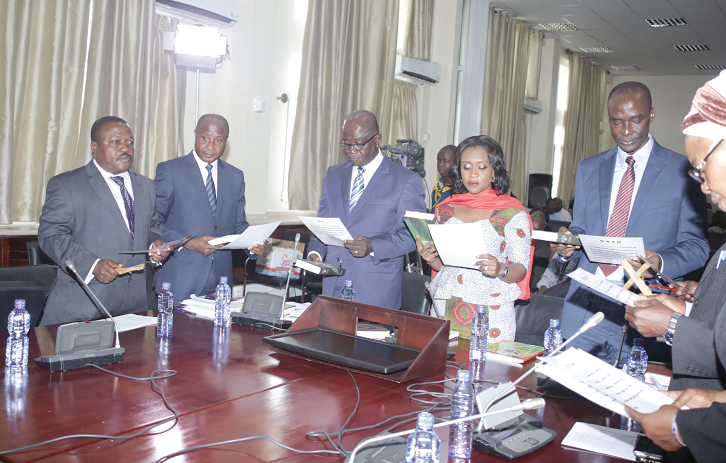
Government to write off GH¢103.1m loans owed by defunct SOEs
The government is planning to write off GH¢103.1 million loans that have been granted to state-owned enterprises (SOEs), which became defunct more than 20 years ago.
Some of the loans are more than 20 years old and have been occurring in government records year in year out.
Answering questions on the 2015 Auditor General’s Report before the Public Accounts Committee (PAC) in Parliament in Accra yesterday, the Controller and Accountant-General, Mr Eugene Ofosuhene, said the SOEs were defunct and could not be traced.
He termed such loans as “window dress” and said the GH¢103.1 million doubtful loans had been compiled and forwarded to the Ministry of Finance for action.
“The doubtful ones are those that are in the books with the owing companies not in existence but the amount keeps recurring,” Mr Ofosuhene Stressed.
He named some of the nonexistent companies as Mankoadze Fisheries, Ommibus Services Authority (OSA) and the Ghana National Trading Company (GNTC).
Mr Ofosuhene suggested that a body must be set up for the eventual writing off of the debts, which had been standing in the government books for the past couple of decades.
Deputy Finance Minister
A Deputy Minister of Finance, Mrs Abena Osei-Asare, moved in and said the ministry would take a decision on the bad loans.
“We cannot just write it off. There are processes to follow. We have to come to Parliament,” she said.
Following the intervention by Mrs Osei-Asare, the Chairman of the PAC, Mr James Avedzi, urged the Ministry of Finance to compile the list of defunct companies owing the government for Parliament to take a decision aimed at eventually cleaning of the books.
Management of Loans
Answering questions on why the Ministry of Finance and the Controller and Accountant-General’s Department (CAGD) were not properly managing records of loans given, Mr Ofosuhene said auditors, in their findings, reported there were inconsistencies in loan recoverables and disclosed that a committee had been set up to reconcile government of Ghana loans.
The CAGD boss said not all the amounts labelled as loans were indeed loans.
For instance, he said the Auditor-General’s Report said GH¢686.5 million was owed the government by Vodafone.
He explained that the perceived loan was government’s equity investment in Vodafone and not a loan.
“We told the Auditor-General that not all the amounts are loans. The GH¢686.5 million is equity. It is not a loan but investment,” he added.
Mr Ofosuhene said GH¢18.7 million had been recovered from debtors and paid into a debt recovery account, adding that “we have evidence”.
The controller further said the government had set up a committee to recover all debts owed the state.
He said the committee was set up to regularly ensure debts were recovered, as well as show movement of debts in accounts.
Single Treasury Account
The committee asked the Controller if the CAGD had carefully considered the effect the government’s policy on Single Treasury Account (STA) would have on commercial banks in the country because, at least, eight banks would be affected in the process.
Under the STA, government balances currently in the hands of commercial banks would all be transferred to an STA at the Bank of Ghana (BoG), and critics say the move would affect cash flow to commercial banks.
But Mr Ofosuhene said the STA, which would be launched today, was a phenomenon that had not happened before.
He said the Public Financial Management (PFM) Act stated that all MDAs accounts should be pooled and transferred to BoG.
According to him, the CAGD and the Ministry of Finance did a lot of work a year ago on the project, adding that MDAs whose accounts would be transferred had been consulted.
He said the essence was for the government to be able to determine its cash and financial position.
Implementation
Mrs Osei-Asare explained that the project would be implemented in stages.
“We are working with banks. We won’t do anything that will have negative impact on banks.
“We share the concerns of the banks. We don’t want them to be out of business and so we are still engaging them,” Mrs Osei-Asare assured.
She told the committee that the government was working assiduously to integrate all MDAs on the Government Integrated Financial Management Information System (GIFMIS) platform.
DACF not in arrears
Mrs Osei-Asare said the government had from this year not been in arrears with regard to the District Assemblies Common Fund (DACF).
“We have made some payments for the 2016 arrears and for the rest, we are making frantic efforts to pay...,” she added.
The committee questioned the CAGD boss as to why the government delayed for 36 months before crediting the Consolidated Fund with £3.6 million it received from the UK government for poverty reduction programmes.
Mr Ofosuhene said the amount was not credited to the Consolidated Fund until June 30, 2013 when, in fact, the money was released to the BoG in 2010.
According to Mr Ofosuhene, he queried the BoG on what happened, and the BoG in response stated that it had requested investigations into what caused the delay in the lodgement of the money into its account.
At that point, Mrs Osei-Asare assured the committee that the Ministry of Finance would take up the issue and report to the committee accordingly.
Answering questions on ghost names, Mrs Osei-Asare said the government’s decision to delete the names of 26,000 public servants who had not registered biometrically with the Social Security and National Insurance Trust (SSNIT) had resulted in majority of the affected workers complying with the directive.
She promised to furnish the committee with further and better particulars on outstanding issues.
